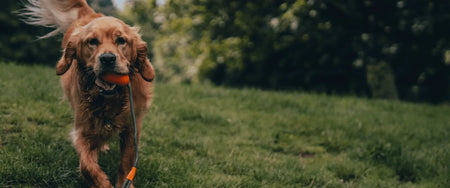Considering our furry friends often consume almost anything that comes near them, a loose stool can be cause for concern for a pet parent, and the thought that it could be your dog’s diet that’s agitating his/her stomach is equally disconcerting.
In this article, we’ll be looking into the possibility of your dog’s diet causing diarrhoea, and specifically, whether a grain-free diet causes loose stool. First, though, what actually is a grain-free diet?
What is a Grain-Free Diet?
A grain-free diet is one without grains like rice, wheat or oats. The carbohydrate sources used instead are potatoes, carrots or pumpkin, with the rest being a protein source such as chicken or beef.
A grain-free diet is meant to emulate what dogs ate when they were the ancestral wolf, and what their digestive system was originally meant to digest. Our guide on grain-free dog food is a valuable resource if you want to find out more about this diet.
Can Grain-Free Dog Food Cause Diarrhoea?
The short answer is no. However, there are many more factors to consider, therefore, the longer answer is that it depends. Our furry friends were not born equal which means their systems are not exactly the same. As a result, different diets affect dogs differently based on breed, the food to which they’re accustomed, allergies and intolerances.
If your dog experiences diarrhoea after being introduced to a grain-free diet, try not to immediately conclude that the reaction was a result of the diet itself. For one, switching diets means that our dog’s digestive systems need to adjust to the new diet. A loose stool is a normal reaction and your dog should be back to normal within two or three days, or at the very most, a week. This is why you shouldn’t go “cold turkey” and swap diets too soon.
Progressively introducing your furry pet to a grain-free diet a little bit at a time, rather than swapping all at once, could be the key to reducing sharp reactions such as diarrhoea, and this is something we’ll come to shortly. If symptoms persist, however, or continue to get worse over a period of time, this is where your vet will come in handy for a proper assessment.
Another reason why your dog could experience a loose stool while on a grain-free diet could be the protein sources in the food. Grain-free dog food is one of the most nutritious diets you could give your dog, but some manufacturers might not consider the protein sources. As such, your dog could be consuming protein that’s difficult to digest, resulting in diarrhoea or constipation. Hence, make sure you go for one of the best grain-free dog food options on the market.
The Importance of Switching Diets Progressively
We’ve established that grain-free dog food does not necessarily cause loose stools but, rather, it’s a quick change from one diet to another that is the most common culprit. So, how can you, as a dog parent, transition your pet to a grain-free diet without sending your dog’s stomach into disarray?
While you’ve probably heard or read of the benefits of grain-free dog food, it’s important to introduce it slowly in your dog’s regular diet allowing the digestive system to adjust bit by bit. Mixing regular kibble with grain-free kibble at the early stages would be a great start. Pay attention to your dog’s stool, coat and whether he/she generally looks forward to diner time. If all goes well, your dog should be completely grain-free in a few days or weeks.
If, during the transition, you notice your dog developing a loose stool, discontinue the process and assess the protein source or even better, swap the grain-free bag for a more bioavailable option. Our nutritious grain free dog food is designed to be easy to digest and to assimilate effectively. This means that your dog will have a smooth transition from regular food and enjoy the benefits of grain-free dog food.
If, however, nothing seems to work, then it's best to feed your dog a balanced diet that works for them without any issues. After all, there’s no one size fits all diet for humans and this applies to our furry friends as well.

What Causes Loose Stools?
If your dog has previously been fine, consuming the same diet with no problems, and then they start experiencing loose stools, then consult your vet ASAP as there might be something going on. We can’t fully rule out food because, as we mentioned earlier, dog’s can (and often do) put whatever they come across in their mouths.
If you’ve ever had a fruit tree in your garden, for example, then you may well have experience in this area. It became obvious very quickly what (or, rather, who) the source of all the missing plums at the end of our garden was…
Allergies and parasites such as hookworms, roundworms or bacterial infections such as Salmonella could be another reason why your dog is experiencing diarrhoea. Again, this is why we say a vet would be the best option in this case to prevent further complications and ease the distress your furry friend is experiencing.
Does Grain-Free Dog Food Regulate Allergies or Intolerances?
This highly depends on the dog breed, the diet it’s been on and also what allergies or intolerances the dog has. It’s important to highlight at this point that allergies and intolerances are not the same thing. Allergies are innate and your dog has had them since it was a puppy. Intolerances are however developed overtime. Your dog could be eating chicken all its life until one day the digestive system decides enough is enough!
If your dog has allergies, consult a medic before trying out a new diet to avoid aggravating the condition. If your dog has developed an intolerance and perhaps starts to experience loose stools, then putting the dog on an elimination diet would be ideal. An elimination diet helps you figure out what food or ingredient could be upsetting your dog so you can get rid of it. It’s something we speak about in detail in our hypoallergenic blog.
An oft-purported myth is that grain-free dog food causes or spikes intolerances in dogs. This could not be further from the truth because there are great grain-free options that have good protein sources. Novel proteins, such as wild boar or haddock, are unlikely to spike any intolerance. In fact, your dog could do very well on novel protein sources since its system has no reason to fight against them.
Final Thoughts
Hopefully, this has helped you understand a bit more as to what could be causing your pooch to have a loose stool. You should work closely with your vet to resolve the issue. If the problem is stemming from a transition to a new diet, then you should monitor your dog for a few days and maybe slow down the process if your dog is having a difficult time adjusting. If your dog just has a sensitive stomach, then we recommend checking out our guide on why dogs have sensitive stomachs and what to feed them.











